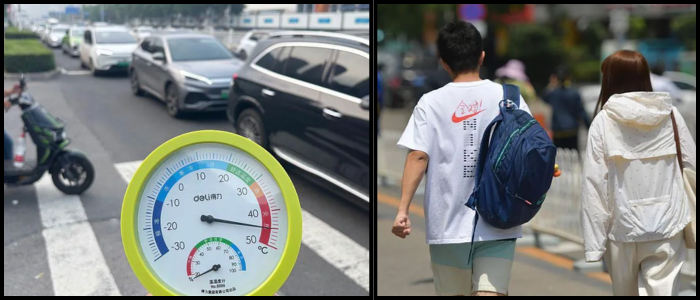In the city of Changchun, a university student, 20, who would give only his surname, Qi, described how he had checked into local hotels for the air-conditioning alone, a costly last resort, he conceded. Most days, he runs a box fan toward a bowl of ice in the dormitory. He calls it his "homemade air-conditioner" that got him through the end of the semester.
The heat is in the early stages of China's sanfu season, the hottest part of the year, often called the dog days of summer. It usually doesn't take off until mid-July, so its early arrival this summer caught many people off guard.
Already, the extreme temperatures have turned tragic. A dormitory guard at Qingdao University, whom students affectionately refer to as dorm "uncle," was found dead in his room over the weekend. While the university has said the cause of death is under investigation, many believe he died of heatstroke. In social media posts, tributes poured in to a man who had, in their view, lovingly cared for stray cats on campus. Also on that day, a student from the same university was taken to the hospital with heatstroke.
Social media has lit up with voices of anxiety and cries for better treatment of support staff and dormitory facilities on campus. "The quality of a university is not found in its buildings, it is found in how it treats the people that keep it functioning," one person wrote.
Adaptation and Outcry as Climate Puts Heat on Kenyan Farmers
The stifling heat is part of a surge of extreme weather events across China. Flash flood warnings were recently issued in the east as a typhoon hit the coast, killing two in Taiwan before churning through China's Zhejiang and Fujian provinces. In the west of the country, floods ruined a bridge between Nepal and China, leaving at least nine people dead and more than a dozen others missing.
The recent heat waves are part of a rising pattern. In 2022, more than 50,000 people died as a result of extreme heat in China, and in 2023, the highest temperature ever recorded in China was logged in Xinjiang province, where the mercury hit 52.5. This year was already on track to be the hottest since China began keeping records in 1961.
Along the eastern region, more than a third of the load on the power grid has been caused by cooling systems, as demand for electricity peaks, in part because of air-conditioning, authorities said. National electricity consumption broke a record in early July.
Some universities in Shandong province have started allowing students to sleep in libraries in the wake of student dissatisfaction and incidents in recent weeks. And some others have said they will place air-conditioning in dormitories over the summer break. Qingdao University has confirmed it, too, will start upgrading its dormitories, a reassurance to the students who had been weighing whether to attend.
A 16-year-old high school student in Jinan, 350 kilometres away, said that the lack of air conditioning at Qingdao University had given him pause about applying there, even though it is his first choice. "It can't be possible to live without air-conditioning, it's so hot," he said.
People across the country are finding new ways to stay cool. In Jilin province, it was reported that students are sleeping in tents inside air-conditioned hallways. An air-conditioned restaurant in Jiangxi province has turned into an unofficial cooling centre for the elderly, some of whom spend hours there without ordering food. In Zhejiang, a man was filmed with a rock through a train window, after passengers became trapped inside a derailed train during a heatwave.
Experts and residents are pointing to climate change as a major factor. "It seems that global warming has really hurt our world," another student in Changchun said. "During my being brought up — when I was young — the northeast was God's country in the summertime. Now, they're growing warmer every year."
World

Chinese Students Escape Dorm Heat in Tents, Libraries

With the sweltering heat continuing to swamp eastern China, students across the country are abandoning their hot and overcrowded dormitories to find cooler places to sleep — from libraries and air-conditioned hallways to supermarkets and even hotels. Rising temperatures — exceeding 104 degrees Fahrenheit (40 degrees Celsius) in recent weeks — have made traditional dormitories with four to eight people crammed in and often no air conditioning unbearable.















